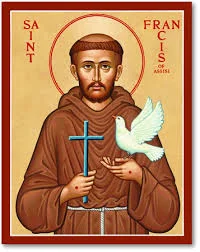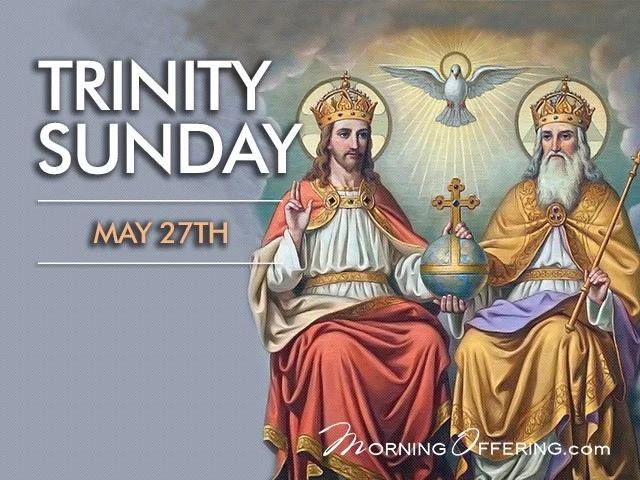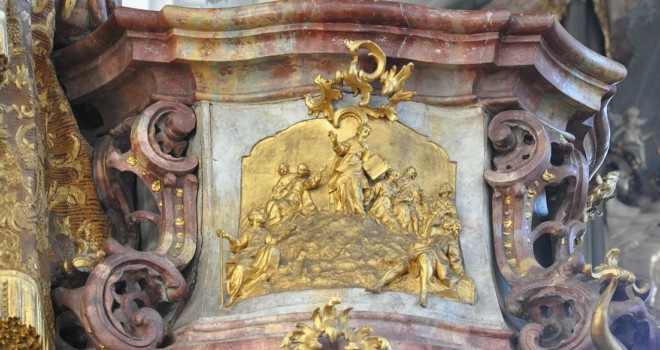As a hart longs for flowing streams, so longs my soul for thee, O God. My soul thirsts for God, for the living God. When shall I come and behold the face of God?
— Psalm 42:1–2
There is a “vital anguish,” as Heidegger calls it, for God in this earth, where humans bear the weight of deprivation, loneliness, and longing for the One most needed. The great Étienne Gilson says, “By intelligence the soul is capable of Truth; by love it is capable of the Good; its torment arises from the fact that it seeks it without knowing what it is that it seeks and, consequently, without knowing where to look for it.”
There is a universal eagerness to remove the obstacle, the veil that covers the supernatural world from natural perception. To see God ought to be the highest aspiration of all human beings. This is why the saints, men and women of God, make their own the words of the psalmist: “Thy face, Lord, do I seek.”
“Hide not thy face from me” (Ps. 27:8–9). God is the goal of the inquisitive mind, the will that is eager to love without limits, and the restless heart.
A Natural Longing
The psalmist tells us: “One thing I ask the LORD, and I seek after: to live in the house of the LORD all the days of my life, to behold the beauty of the LORD, and to inquire in his temple” (Ps. 27:4). Very conscious of the fact that man was created to see the First Principle, St. Augustine wrote: “Lord, I have been created to contemplate You, and I have not achieved that for which I was created!”
“A longing for God,” as Karl Adam beautifully expressed, “is the natural dowry of the human soul, its immortal jewelry, the most illuminating of the sparks of the divine love which are shed on human nature.” St. Josemaría attests that “the desire for God comes from the deepest recesses of the heart of man.”
The thirst for God is common to all because we were made by God and for Him. The restlessness of the heart, the desire for eternal happiness, for fulfillment, to love and to be loved, is nothing but the thirst for the veiled God. It is a thirst that only He can satisfy.
St. Thomas Aquinas ended his celebrated hymn “Adoro Te Devote” with these lines: “Jesus, for the present seen as through a mask, give me what I thirst for, give me what I ask: let me see your glory in a blaze of light. And instead of blindness give me, Lord, my sight.”
“Hunger for God,” wrote Bishop Alvaro del Portillo, “cannot be satisfied in this world, and so we seek complete union in eternity.”
This common anguish on earth is reflected in the antiphon of Lauds of the Saturday of the First Week in Ordinary Time, which asks the Lord to illumine those who sit in darkness and under the shadow of death. It expresses the feeling experienced in this world while awaiting the light of His vision in the life hereafter. This longing in the midst of shadows, as experienced by countless persons, including great saints such as St. Teresa of Jesus and St. John of the Cross, has been called the dark night of the soul. St. John of the Cross wrote in the first stanza of his Spiritual Canticle: “Where have you hidden, beloved, and left me with my grieving?”
Alfonso Aguiló recounts how, in 1956, Mother Teresa of Calcutta told the archbishop of that city, “I want to be an apostle of joy.” But by a mysterious disposition of Divine Providence, she sometimes carried her apostolate of cheerfulness in the midst of an unbearable dryness: “Occasionally,” she said, “the agony of God’s absence is so great, and alongside it the vivid desire for the Absent is so profound, that the only prayer that I am still able to recite is ‘Sacred Heart of Jesus, I trust in you. I will satiate your thirst for souls.’”
The Thirst for God
St. Teresa said: “O my delight, Lord of all created things and my God! How long must I wait to see You? What remedy do You provide for one who finds so little on earth that might give some rest apart from You?”
Together with the longing for the life to come, St. Josemaría had very much in mind our remaining tasks on this earth. In a meditation he gave in 1972, he said:
Every instant of our lives has an eternal meaning. My children, this world is passing; it is not in our hands. We cannot waste time, which is short. We must really set ourselves to the task of personal sanctification and of our apostolic work. The Lord has entrusted it to us; we must spend it faithfully, loyally, and administer it well. We must use the talents we have received with a sense of responsibility
During our earthly exile, we experience both the need for the Almighty and the deprivation of the vision of Him. This makes for suffering. Endowed only with the poor and partial vision of things, we have a nostalgia for the lost Paradise and a deep, intuitive longing for Heaven, where the total vision is to be found. Man was made for that; his entire being pines for that! He was created for Heaven. Hence, in this earthly exile, his deepest vital anguish, his most insatiable thirst can be satisfied only by the discovery, the loving encounter with the now secluded Lover. The psalmist says it clearly: “The Lord is my light and my salvation” (Ps. 27:1).
“Hide not thy face from me,” exclaimed King David (Ps. 143:7), and Psalm 89 echoes this anguish: “How long, O Lord? Will thou hide thyself forever?” (v. 46).
This article is from a chapter in Why God Hides.
The longing for the Lover grows hand in hand with contemplation. Now we see Him under obscure images, for “it does not yet appear what we shall be, but we know that when he appears we shall be like him, for we shall see him as he is” (1 John 3:2).
That deep desire for God, found in our hearts and experienced in varying degrees, can be articulated by the expression “Maranatha! Come, Lord, Jesus!” (Rev. 22:20) and by those words that our Lord Himself taught us: “Thy kingdom come!”
With God’s help, man manages to remove, as it were, bit by bit, the veil covering the shielded Lover. In so doing, he experiences great joy and consolation. This is not surprising, for the Creator made man for the light, not for darkness. They make their own this saying of St. Paul: “For He is our peace, He has made us both one, and has broken down the dividing wall of hostility” (Eph. 2:14).
Lukewarm persons feel annoyed by the present situation. In their inability to see the Lord and the other persons of the supernatural world, they seek an excuse for their lack of faith. They ask: “Where is God? Where can He be found? Is He hiding somewhere?” They argue that they could be vibrant and dedicated to the Ultimate Being, were He not so remote and concealed.
The cause of the deepest longing that man has — this vital anguish — is the need for God. This need is coupled with the fact that He is outside of man’s sense perception. Since He is a Spirit without any matter, He cannot be seen.
But the Almighty looks at man with infinite care and love. As the inspired psalmist sang: “The Lord looks down from heaven, he sees all the sons of men; from where he sits enthroned he looks forth on all the inhabitants of the earth, he who fashions the hearts of them all, and observes all their deeds” (Ps. 33:13–15).
Different Ways of Longing for God’s Vision
There are different manners of wanting to see God. One is the way of the person who is tired of living “in expectation.” He wants evidence to satisfy his mind, which tells him that there must be Someone behind everything — in the wonders of nature, for example. He does not want to trust, for to believe in God always implies trusting Him. He is curious about the identity of that Someone but is uncomfortable about not being able to perceive Him with his senses. He blames the Maker for not manifesting Himself. The situation could be compared to the case of one who smells something burning and goes out anxiously to find what is causing it. Annoyed because he does not see the flames, he says, “There is no fire!”
A different way of longing for the Lover’s face is found in the individual who believes in God. He is eager to see Him because he is in love with the secluded Lover and is eager to see Him, as all love-struck persons are. This is the case, for instance, of St. Teresa of Jesus, who, toward the end of her life, kept repeating: “Jesus, it is about time that we see each other!”
In both cases there is desire, even impatience, to see the Lord, but only in the second instance is the motive a good one, for it is prompted by faith, hope, and love.
To Cross the Barrier
The desire to know the future with certitude is universal. It includes eagerness to unveil the mystery of life. It shows itself in a longing to penetrate the divide that separates not only today from tomorrow but also this temporal world from the next, the human from the divine. Superstitious beliefs such as the horoscope are related to this desire.
In the last moments of a dying person, when someone — a doctor or a nurse — says, “He or she is gone!” it is likely that a question comes to mind: “Gone? But, where?” In those moments, the reality of the gulf, the partition that separates this world from the next, is keenly felt; and death appears as a jump from this world to the other world behind the partition.
If the desire to see the concealed Father is universal, scholars devoted to the study of the things of God — theologians — could be expected to experience this yearning in a special manner. Along these lines, Benedict XVI said: “For me, theology is the attempt to get to know the Beloved better.” In the pope’s mind, theologians are to undertake not just a cold, scientific research concerning the Supreme Being but a loving search for the shielded Lover.
The saint of Avila had dealt with the Divine Lover for many years through the veil that separated her from Him. She had eagerly waited for the moment in which the veil would be removed and the view would no longer be obstructed.
From the earliest times human beings have looked at Heaven as their lost Paradise. The hearts were made for happiness, but they remained deprived of vision and fulfillment as a consequence of sin. St. Augustine pointed to our anguished situation when he wrote, “We are created for You, Lord, and our hearts are restless until they rest in You.”
In Shadows Only
In dealings with persons of the supernatural world, there are two main characteristics. One is the discomfort due to not being able to see face-to-face the person one is talking to. The second comes in handy: the certainty that the interlocutor is truly there, a certainty based on faith.
These two combined give rise to a semi-light, a chiaroscuro, a state of affairs that may be called “seeing in the midst of shadows.” It is the vision characteristic of the journey on earth that, while illumined by faith and reason, strikes a sharp contrast with both the perfect light of Heaven and the total darkness of Hell. This uncomfortable condition creates a yearning for the Beatific Vision in the Eternal Day, as well as a dread of the perpetual Night of Hell.
Not a Lonely Search
The search for the Living Lord is a very personal endeavor. It is a task assigned to each person individually and in a nontransferable way. Each one has to engage in this search. And yet, thanks to the sterling Communion of Saints, it is an accompanied affair. The Triune God is the most interested; He is the one who decreed this present exile that will determine man’s future status in eternal life. The Lord always helps in the search and in the finding.
God the Father has the interest of an infinitely loving Father for the well-being of His children. God the Son has the interest of a Redeemer who wants to see the fruits of His costly Redemption. God the Holy Spirit is witnessing man’s free response to His unceasing work of sanctification.
The Blessed Mother, Mary, follows the pilgrim steps of her children too, as no other mother would do on earth. Joseph does the same as the Virgin does, as do the angels and the souls in Purgatory, to the extent that God gives them power to do so.
The entire Church on earth also provides continuous assistance, sending (as St. Josemaría was fond of saying) arterial blood, which provides oxygen to the cells. This is done mostly in the form of anonymous prayers and sacrifices coming from countless fellowmen.
There is also the guidance of the legitimate shepherds, the pope, the bishops, and priests, as well as the edifying and warm encouragement provided by brothers and sisters in the Faith, most especially relatives and friends.
Therefore, it is not a lonely search. Because he communes with God’s family in the company of witnesses, the Christian’s call has a wonderful ecclesial and social dimension.
Editor’s note: This article is adapted from a chapter in Why God Hides, which is available from Sophia Institute Press By Fr. John Portavella
Fr. John Portavella earned a doctorate in Canon Law from the University of Santo Tomas (the Angelicum) in Rome. He was ordained in 1959 for the Opus Dei Prelature. He is currently doing pastoral work at the University of Asia and the Pacific in Pasig City, Metro Manila.



















